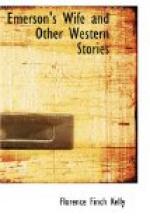This Chinee Kid was not Ah Sid, but another one whose name was Ah Wing. He was a Chinee Kid only so far as he was n’t a Boy, and just how much of him was Chinee Kid and how much was Boy is difficult to say. Sometimes he seemed to be mostly all one, and sometimes just as much the other, and, again, he was a harmonized mixture of the two.
Wing’s father and mother were both Chinese, but Wing had been born and had lived all his nine years in the town of Tobin, which is in California, on the overland road, far enough up the Sierra climb for the east-bound trains to have always two engines when they pass its depot. He wore Chinese clothes, except upon his head, whereon invariably reposed the time-honored hat of the American village boy, that always looks the same whether it is one week or one year old—the hat that is dirty gray in color, conical as to crown, sloping as to brim, and dilapidated as to general appearance, the hat that is irrefragable proof that its wearer is a Boy. This head-gear he wore over the queue of his forefathers, braided, ebony, shining, and hanging half-way down his little legs.
Wing could jabber Chinese as shrilly and rapidly as any of his playmates of the Chinese quarter, and with his young friends of the white race he could reel off amazing vocabularies of American slang. And he could swear, and frequently did so, with all the nonchalance of a Chinaman and the intensity and picturesqueness of an American. He could, if the occasion seemed to demand it, drop his eyelids and “No sabe” as stupidly as any Celestial who ever entered the Golden Gate. But with any man, woman, or child whom he chose to favor with his conversation he could talk volubly in fairly good English. And his lungs were just as capable, and just as frequently put to the test, as those of any white boy in Tobin, of the ear-splitting shouts and yells without which boys’ games cannot be played and boys’ thoughts communicated to one another.
Wing had such an amazing ability to seem to be everywhere at the same time that he was nicknamed “Wings.” But no one ever called him that to his face who wanted him to answer a question or pay any attention to what was said to him. The first time it was tried he protested, with all the dignity of George Washington insisting on his title of President, that his name was Wing. After that he merely met the nickname with a blank, solemn, “No sabe” stare, as uncompromising and as impenetrable as a stone wall. It was impossible to look out of doors at any time or in any part of Tobin without seeing Wing. He was always going somewhere and was always in a hurry, but he was always ready to stop and chat for a moment with any one, large or small, who addressed him without giving offence.
Everybody knew him, residents and summer visitors alike. The men all teased him and the women all petted him. Nobody knew or cared in which one of the dozen houses of the Chinese quarter Wing’s father and mother lived, nor whether his father had a laundry, a store, or a garden. They were nobodies; but Wing was a public character.




